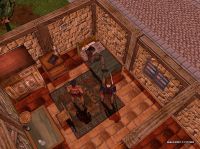|
|
|
Main News Forums Games Games Database Top 100 Release List Support Files Features Reviews Previews Interviews Editorials Diaries Misc Download Gallery Music Screenshots Videos Miscellaneous Staff Members Privacy Statement |
Ekim's Gamer View: Traditional Thinking Michel "Ekim" Veilleux I'm going to ask a lot of rhetorical questions this week. I'm not sure I have the answers for those myself, and I hope that if you do, you are a developer or publisher and the future of our gaming love rests in your hands. I sat down reflecting about the future of RPGs and that brought me to thinking about traditions. From one society to another, human beings have different traditions that they follow. It's the same with games. Game genres have different traditions to which they cling to. Action games have a simplification of rules and a plethora of weapons at the player's disposal. Real Time strategy games have the different units to command. Adventure games have lush backgrounds, puzzles and slower gameplay. What is the tradition for RPGs? When we say that a CRPG is "traditional", what does it really mean? What feature is in every single CRPG and why? What is a CRPG? It's the statistics. An action game will be a simple action game if the protagonist doesn't have any attributes with numbers attached to them. Some who know the Thief series of games will tell you that there were some RPG elements in those games, but strangely enough they were never categorized as Action RPGs simply because you never had access to your character's stats sheet. Some would argue that Diablo is more of an action game than Thief, still it was called an Action RPG simply because you could click a button and see your character's stats neatly displayed on your screen. What else? Is that good or bad? What does it really mean? Are we so interested in numbers that we need to see our character's relative strength displayed in numbers to feel secure as players? It might be a question of customizability, but what's stopping the developer to just offer us a set of pre-built character classes from which to chose from? In some CRPGs stats are so useless as to be considered decorative to the interface. But they are still there for some reason. Is that really the defining feature of a CRPG in today's market? Questions, questions... and more questions |
|||
|
All original content of this site is copyrighted by RPGWatch. Copying or reproducing of any part of this site is strictly prohibited. Taking anything from this site without authorisation will be considered stealing and we'll be forced to visit you and jump on your legs until you give it back. |
||




